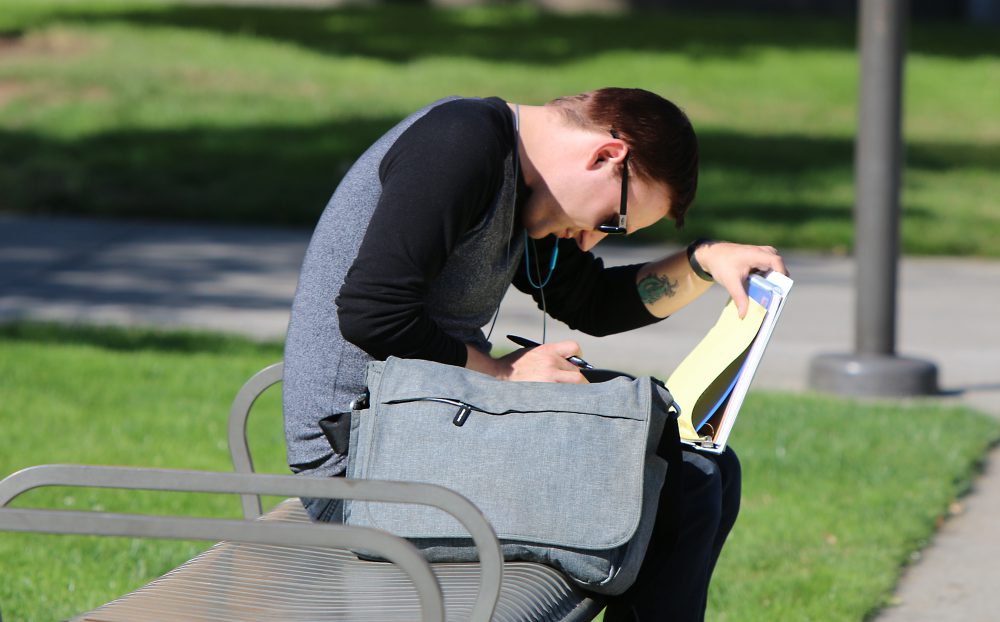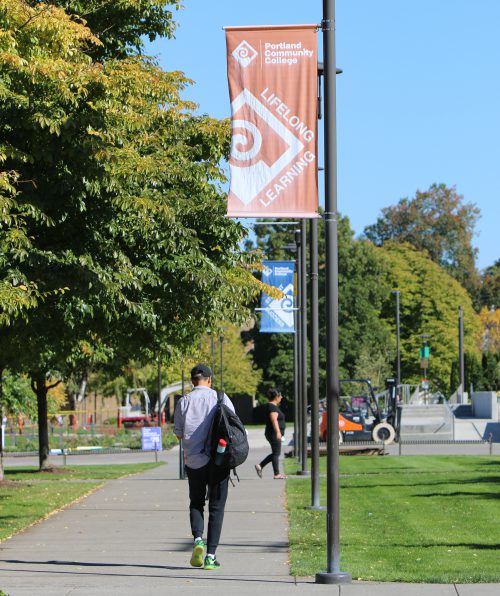This content was published: February 6, 2017. Phone numbers, email addresses, and other information may have changed.
PCC completes successful $2 million Title III project that improved the student experience
Photos and story by James Hill
 When a project involves more than 500 staff and at least 70 projects, it’s a big moment when it comes to an end. Especially, when it was really successful.
When a project involves more than 500 staff and at least 70 projects, it’s a big moment when it comes to an end. Especially, when it was really successful.
This fall, Portland Community College put a wrap on its six-year Financial Literacy and Access to Improved Resources (FLAIR) project that improved coordination and efficiencies among departments, capacity to serve students across the district, funding for them to pay for college, and improve students’ financial management.
Highlights are Impressive
- Creation of Panther Tracks, a guided step-by-step process to degree completion.
- Development of Panther Works into a resource that clearly communicates all career-related services to students.
- Student Accounts call center wait times cut from more than four minutes to under three.
- Sixteen percent of students received their financial aid electronically in 2010 versus 80 percent this year.
- Website improvements to show student account information clearly and guide students in the financial and academic processes.
- Decreased the number of Veteran Affairs benefit re-certifications for students who are vets from more than 70 to 45 percent.
Stats Paint the Picture
In 2010, PCC earned a $2 million Title III Strengthening Institutions Program grant from the U.S. Department of Education to establish and run FLAIR. As a result, the college has been able to drop the median processing time for financial aid awards by 50 percent and decrease the number of students who are sent to collections for overdue balances by 51 percent. And, the number of students awarded scholarships through the PCC Foundation has increased by 161 percent.
“We began this effort at a time when our enrollment was growing rapidly, we faced increasing accountability requirements related to financial aid, and many of our finance-related services to students were still manual, paper-based, and uneven across our campuses,” said Executive Vice President Sylvia Kelley. “Many thanks go to everyone who has contributed to this massive effort.”
Another big area for improvement by the college has been support service for military veterans. PCC created a dedicated benefits web page that connects to MyPCC, Pa nther Tracks and staff at all four campuses. The processing time of VA certifications has fallen from as much as four weeks to an average of fewer than four days.
nther Tracks and staff at all four campuses. The processing time of VA certifications has fallen from as much as four weeks to an average of fewer than four days.
College staff organizes regular VA workshops to help decrease the amount of recertifications by vets. Recertification means the student had to change their schedule and submit it to be re-worked multiple times until it was right. As a result, 95 percent of students responded that they would recommend the workshops to another student vet.
“The VA advising workshops have specific information for veterans about their education and VA Education Benefits, and have been a huge success,” said Jeff DeMott, financial aid coordinator who focuses on VA benefits at the college. “The small group workshops help students understand the complexities of using benefits and help students avoid getting into situations that in the past caused some students to repay money to the VA.”
Independence Not a Great Thing
Departments that had substantial reform to their operations and services include Financial Aid and Veterans Education Benefits, Student Accounts, PCC Foundation, Career Development, and Jobs & Internships. All operated mostly on their own, which caused issues for students seeking services.
“Today, these branches work more collaboratively,” said Rhonda Boyd, who oversaw the FLAIR project. “The college’s web team was the underpinning of the whole thing as they made sure we could bring information up that was more transparent for students, simplifying it for them so they are prepared financially ahead of time. There was streamlining to get all of the student services together to eliminate inefficiency and coordinate the processes so they can serve students better.
“It’s been a big win for the staff, as well as the students,” she added.
Financial Aid Becomes Model
The Financial Aid Department implemented a customer service model that includes a new financial aid online dashboard, improved document handling and staffing, created production teams, and enhanced policies, procedures and communication. Assistant Financial Aid Director Elijah Herr said the best improvement has been the feedback from students. In 2012, Financial Aid’s positive customer service response hovered around 50 percent. Last year, the positive response surged to 87 percent thanks to its staff’s knowledge, timeliness, courteousness, and accuracy.
“Those numbers are rarely seen in a financial aid office,” Herr said. “The benefit of the Title III grant to our students has been phenomenal. I can honestly say that there is no process or position within the Financial Aid office that has not be positively impacted by the program. As a former financial aid student at PCC myself, I can tell you the student experience is a 100 percent improvement in all service areas.”

PCC Foundation Grows Awards
FLAIR improved the PCC Foundation’s business practices and increased its capacity to fundraise to support more students. The charitable organization of the college went from $835,000 in scholarships for students in 2009-10 to almost $1.5 million in 2016-17. Other noteworthy benefits included increasing the PCC Foundation endowment to almost $7 million from just under $4 million six years ago, growing the number of major donor gifts to the endowment and increasing its alumni contacts.
But one of the key areas has been improving its scholarship program by making the process easier and awarding funds in a more timely manner.
“The amount of applicants has doubled and our application process can be open longer, with a shorter turnaround time,” said Jennifer McBratney, the PCC Foundation scholarship coordinator. “We also created the scholarship application guide web site as part of Panther Tracks. This is the first scholarship-dedicated web site we’ve had, and it has done a great job of cutting down minor questions about scholarships. In fact, that site has gotten more traffic than any other Panther Tracks site.”
For more details on how the college has improved student access and success, visit www.pcc.edu/flair
